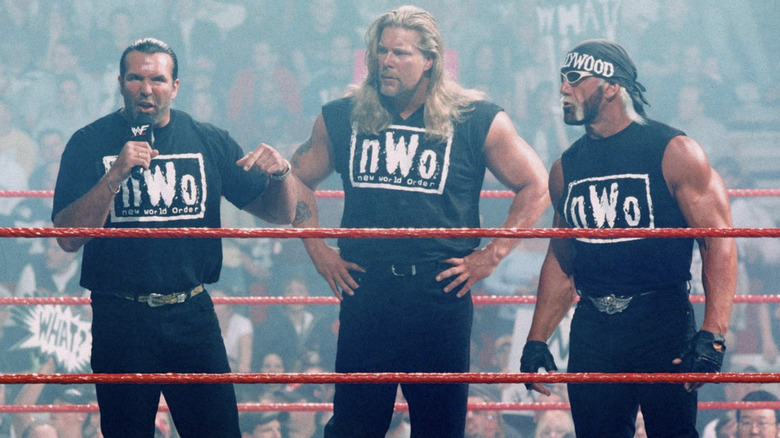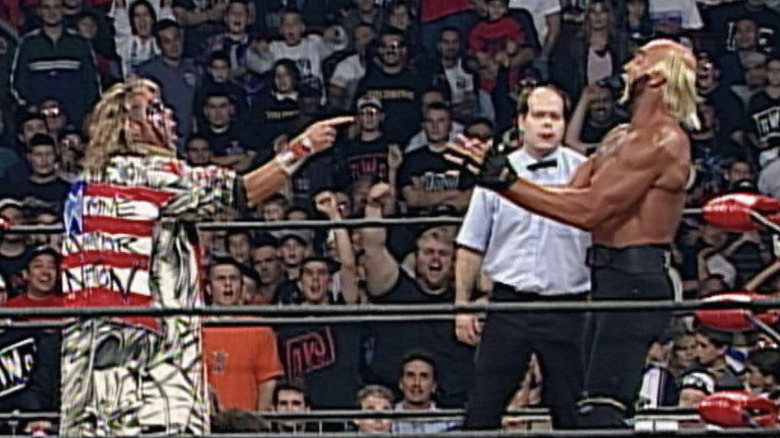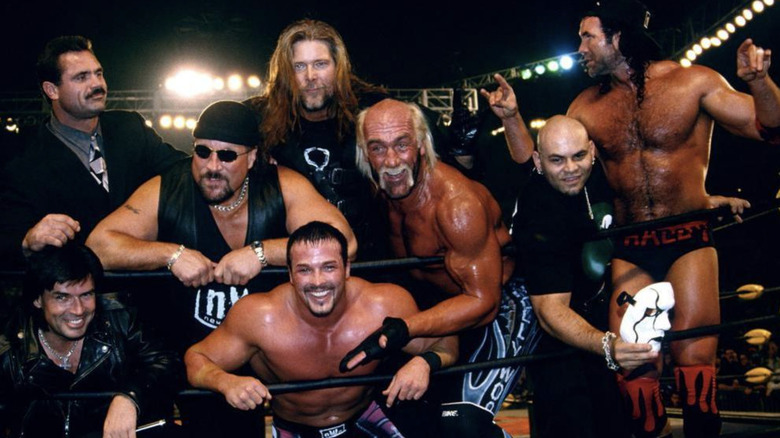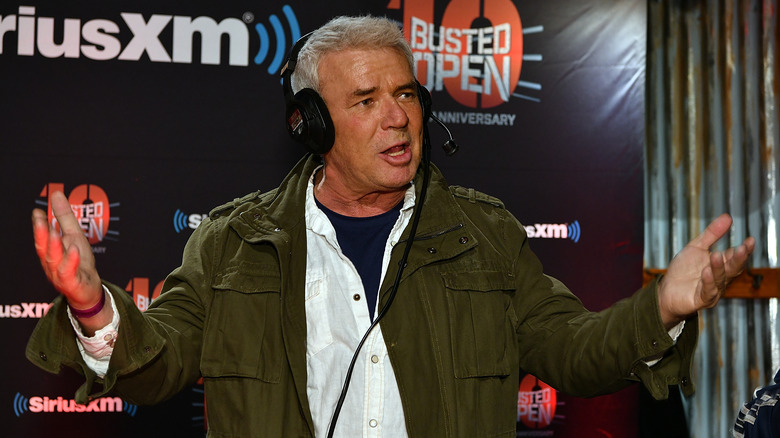Eric Bischoff Assesses Various Missteps With The NWO In WCW
During a recent episode of "83 Weeks," Eric Bischoff took time to discuss the various missteps of the New World Order and how that played a part in the downfall of WCW overall. One of the talking points included the 1997 Souled Out pay-per-view that featured NWO vs. WCW matches.
"I know that Souled Out gets a lot of heat," Bischoff said. "That's the kind of narrative over the years because it didn't perform well financially, but there were a lot of reasons for that. I wouldn't say a lot, there was more than one reason for that."
Those factors included it being a Saturday night, taking place in Iowa, and the fact that it occurred in January in the midst of WrestleMania season. Bischoff noted that he still likes the concept of Souled Out even though it could have been executed better.
"It was strategic, but it was also so creatively different than anything else we were doing on pay-per-view at the time. I still believe to this day that if you're driving 12 pay-per-views a year, you better be really good at figuring out how to give each of them a personality, and Souled Out had a personality. It was different. It shattered the norm of what pay-per-views are supposed to look like, and that was my goal."
Bischoff feels that anyone who pushes the envelope stumbles and hits speed-bumps along the way. While Souled Out was a "big" speed-bump for different reasons, he disagrees that it was a failure.
Ultimate Warrior's Debut: Big Mistake At The Worst Time
Bischoff went on to agree that the NWO was watered down by the different variations including the Latino World Order and The Wolfpac. Despite that, he still digs the idea of the LWO and notes that obviously, WWE does as well considering its recent revival.
The WWE Hall of Famer also conceded that they didn't cast properly as several of the characters that were brought in did not fit the story. On top of that, another misstep involved The Ultimate Warrior and One World Nation.
"One of the things that really exacerbated the dilution of the NWO story was bringing Warrior in," Bischoff continued. "Took the focus off. Because you're bringing Warrior in, you gotta put a lot of attention on that. You got backstory you're trying to recreate or expand on and that took so much focus off what we were doing at the time."
"Of course, Warrior was really good at coming up with ideas that would get Warrior over, and I went along with it. So did Kevin Sullivan, we all did. My decision ultimately, not Kevin's, and it was a mistake. There's no way you can look at that and say it wasn't. But it wasn't because Warrior came out and took a 12-minute promo and turned it into a 30-minute television show that bored the audience to death and ruined his debut. More importantly, we took our eye off the ball creatively. That was a big mistake at the worst possible time."
Managing Personalities Took Energy Away From Creativity
Conrad Thompson also asked Bischoff about when he felt the NWO's creative direction taking a turn. In Bischoff's eyes, it was in the early part of 1998 when clashing personalities became an issue.
"Creatively, I would say that the NWO started feeling less exciting for me as a creator, producer early-mid '98 because that's when the energy started to dissipate internally. That's when the collaborations — so much of the success of the NWO wasn't because of me or anybody else. It was the result of everybody working together and collaborating and having fun in the process. That stopped around second quarter of '98, and it began to be more work and less fun because now we're managing personalities and chemistry."
Bischoff explained that once he started managing personalities, they weren't putting a lot of time into creating something productive or fun. They had no creative energy while putting out fires. At the same time, their financials told a different story.
1998 Was WCW's Most Successful Year Financially
"Now, the opposite side of that coin is the money was coming in more than it ever had," Bischoff added. "So it wasn't like we could look at our financials and go, 'Hm, if we analyze the financials over the last 60 days, it suggests that this idea is not working.' It was the opposite of that."
"Despite the Hogan-Sting finish that everybody thought was the downfall of WCW, '98 was the most successful year that we had after that finish that everybody hated. I'm not trying to justify the finish too, by the way. I hated it in retrospect or even in the middle of it," he said.
Bischoff also explained that he would not have brought back the NWO initially if he had purchased WCW. Perhaps it could have happened down the line, but he thought their creative was "in the toilet," which is also why they never did a Wolfpac vs. Hollywood war angle.
If you use any quotes from this article, please credit "83 Weeks" with a h/t to Wrestling Inc. for the transcription.



